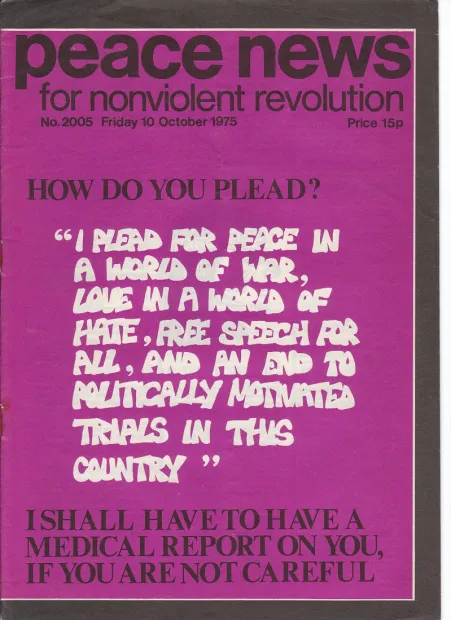Fifty years is a long time in politics… and it was fifty years ago that four young anti-militarists in Aberdeen were arrested under the arcane charge of Incitement to Disaffection. I was one of those accused of trying “to seduce a member of Her Majesty’s Forces from their duty”. Though I doubt whether I’ve ever seduced anyone in my life, in this case it was for giving members of the armed forces the leaflet Some Information for Discontented Soldiers. Not the sexiest of seductions perhaps.
This was at the height of the shooting war in Ireland and we were part of the British Withdrawal from Northern Ireland Campaign (BWINIC), closely linked to the magazine Peace News, then in Nottingham. BWINIC found that many soldiers were reluctant to serve in Northern Ireland, in some cases because they were of Irish background or had other objections to that war. Bloody Sunday – the massacre in Derry by British soldiers – was recent and soldiers knew more than anyone that they were unwanted in Catholic areas while at the same time there was a degree of collusion with Unionist terror by the army. In some cases they just didn’t want to be shot or shoot others. Many were, as we said, discontented and wanted to leave.
There was a legal advice service called At Ease, run by pacifists, but also an underground railroad to exile in Sweden. Most soldiers, even officers, did not know their rights.
Some soldiers simply went on the run and, um, a few were helped with false papers.
It was not long before the state became a bit edgy about our activity and fourteen members of BWINIC were charged with Conspiracy to Incite Disaffection. That they had never met as a group and some had not met the other alleged conspirators at all was neither here nor there. This was serious. Incitement had a maximum sentence of two years, conspiracy had a maximum sentence of life.
Around the country others were arrested. If our fourteen colleagues went down, we would go down. We formed a Defence Campaign. It was an era of political trials – such as the “Persons Unknown” case where a handful of anarchists including Ronan Bennett (later a novelist and screenwriter) were on remand for eighteen months before being found not guilty of conspiring with Persons Unknown. The Mary Whitehouse blasphemy trial came in 1976. Did you see the play at The Playhouse? In all these four trials there was an element of the establishment versus the counter-culture. The ABC (Aubrey, Berry, Campbell) trial of three journalists under the Official Secrets Act came a little later. This trial became absurd when badges were made asking “Who is Colonel B?”, the name of a key character in the case. And that is without even going into trials like the Birmingham 6 frame-up.
In the BWINIC 14 case the clash became obvious on day one when the playwright Tenebris Light, when asked to plead, replied “I plead for peace in a world of war, love in a world of hate and an end to politically motivated trials in this country”. Judge McKinnon replied “I shall have to have a medical report on you, if you are not careful.” Within days this exchange appeared nationally, fly-posted on walls. When the defendants gave flowers to the jury, the judge remarked “At least they are not pansies,” giving the famously camp Tenebris the opportunity to say “There’s nothing wrong with pansies.” Knockabout stuff, but McKinnon’s description of ‘human rights’ as ‘an emotive expression used in international documents’ was shocking.
OK, it wasn’t like the Chicago Seven trial of 1969 which exercised America, but still.
The London trial lasted 51 days, resulting in acquittal on all the serious charges. The jury had, we understand, decided on day one that the defence case – that we were not seducing soldiers from their duty, but giving advice to already discontented soldiers – was solid. There had been an earlier leaflet that had been less clear and sent the prominent pacifist Pat Arrowsmith to jail for eighteen months.
It was all a bit risky. The small-scale underground railroad was never discovered. But who printed the leaflets, which were distributed in their thousands at military bases, on army open days, left in likely pubs? Well, several groups. But had one particular policeman, sauntering through the open front door of a rural farmhouse in Aberdeenshire gone into the living room rather than the hall he might have won promotion. He’d called to check the address of someone who’d been cautioned for riding a motorbike without a crash helmet!
The trial made it easier for soldiers who were disaffected to leave the army. In fact we probably did the army a service because why would they want to hold on to unhappy soldiers? But the year of arrests and the lengthy trial and preparations for the trial knocked the stuffing out of BWINIC – a fledgling and small organisation.
Our group had come out of the pacifist movement. The main political opposition to the British war in Ireland was the Troops Out Movement. Whilst TOM called for self-determination for the Irish people as a whole and the withdrawal of troops it was close to Sinn Fein and there was an undercurrent of support for physical force nationalism. BWINIC was not nationalist by nature, but also had concerns that the Unionist majority in the north had to be won over. In any case, we argued, neither the British Army or the IRA could win a military victory.
BWINIC faded out. I was briefly involved with TOM, later, in Nottingham, in the absence of anything else. That too faded and after the Good Friday agreement TOM was more or less defunct. The fourteen charged with conspiracy were mostly older than the Aberdeen group, and at least eight have gone to that big anti-militarist campaign in the sky. It was, after all, fifty years ago…
Ross Bradshaw

Leave a Reply